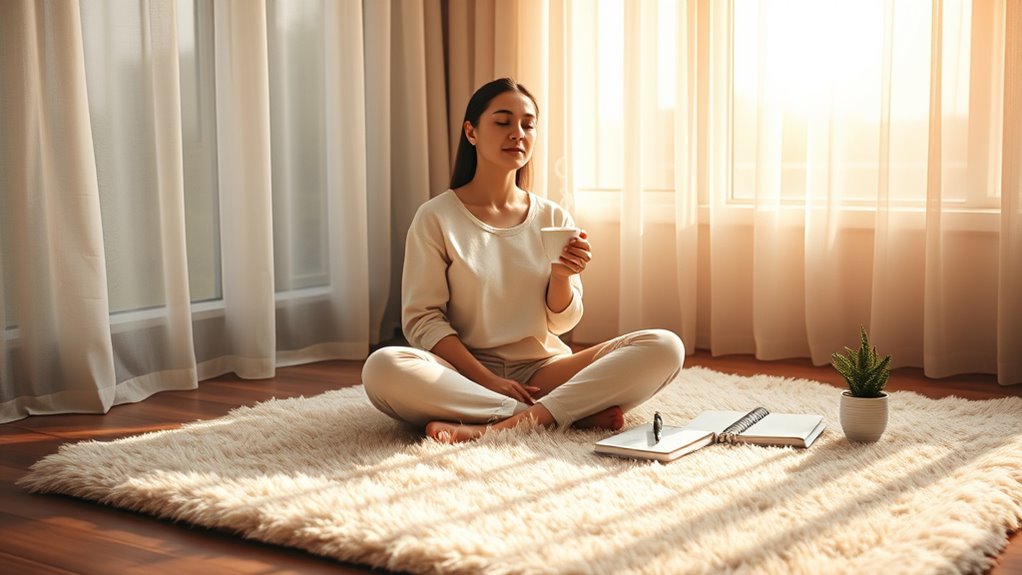To reduce daily stress, start small with micro-habits like mindful breathing, quick stretching, or taking brief pauses throughout your day. Focus on slowing your breath, moving your body for a few seconds, or simply pausing to feel present in the moment. These tiny practices help calm your nervous system and build resilience over time. If you keep practicing these simple habits, you’ll discover even more effective ways to stay grounded and relaxed.
Key Takeaways
- Incorporate quick mindfulness pauses during daily routines, like brushing teeth or waiting in line.
- Practice deep breathing exercises, such as inhaling for 4 counts and exhaling for 6-8 counts, multiple times daily.
- Schedule brief movement breaks, like stretching or short walks, to boost mood and reduce tension.
- Set reminders to engage in micro-habits like mindful breathing or stretching throughout the day.
- Build a consistent routine of small stress-relief practices to enhance resilience and emotional well-being over time.
Simple Micro-Habits to Ease Daily Stress

Everyday stress can feel overwhelming, but small, intentional habits can make a significant difference. One of the simplest yet most effective ways to manage stress is by integrating mindfulness exercises into your daily routine. These practices help you stay present and grounded, preventing stress from spiraling out of control. You don’t need hours or special equipment—just a few moments of focused attention can boost your mental clarity and emotional resilience. For example, take a minute or two to notice your surroundings, observe your breath, or simply acknowledge your thoughts without judgment. These tiny mindful pauses can dramatically reduce feelings of anxiety and help you approach challenges with a calmer mindset. Incorporating consistent relaxation practices can also improve your overall well-being by supporting emotional and physical health. Breathing techniques are another powerful micro-habit you can adopt to curb stress quickly. When you feel overwhelmed, your body reacts with rapid, shallow breaths that can escalate feelings of panic. Counteract this by intentionally slowing your breathing. Try inhaling deeply through your nose for a count of four, holding your breath for a count of four, then exhaling slowly through your mouth for a count of six or eight. Repeat this cycle a few times. This simple breathing technique activates your parasympathetic nervous system, which promotes relaxation and helps lower your heart rate. It’s a quick, accessible tool you can use anytime, anywhere—whether you’re at your desk, in a car, or waiting in line. Involving your body in movement, even through brief stretches or walks, can also reduce stress levels and improve mood throughout the day. Research shows that physical activity is an effective way to combat stress and boost mental health. Incorporating these micro-habits into your day doesn’t require major overhauls or extra time. Instead, it’s about creating small, intentional pauses that interrupt stress in its tracks. For instance, you might set a reminder to pause and do a breathing exercise every hour or two, or pair mindfulness exercises with routine activities like brushing your teeth or commuting. Over time, these tiny habits build a foundation for better stress management, making you less reactive and more resilient. The key is consistency, doing a little each day adds up, and soon, you’ll notice a calmer, more focused version of yourself. Remember, managing daily stress isn’t about eliminating it entirely but about equipping yourself with simple tools that can be summoned whenever stress arises.
Additionally, understanding the importance of risk management can help you approach stress and other challenges more effectively, creating a more resilient mindset.
Frequently Asked Questions
How Long Does It Take to See Stress Reduction From Micro-Habits?
You might notice a change in your stress perception within a few days of habit formation, but consistent practice is key. Some micro-habits, like deep breathing or stretching, can quickly reduce stress levels, while others take longer to influence how you perceive stress overall. Typically, it takes about three weeks of regular effort to see lasting benefits, but individual results vary based on consistency and effort.
Can Micro-Habits Replace Professional Stress Management Techniques?
Sure, micro-habits like mindfulness practices and breathing exercises can seem like tiny superheroes, but don’t expect them to fully replace professional stress management techniques. While they help you manage daily tension, complex issues often need expert guidance. Think of micro-habits as helpful sidekicks—great for quick relief but not a substitute for the full superhero team of counseling or therapy when stakes are high.
Are Micro-Habits Effective for Severe Anxiety or Depression?
Micro habits may help manage daily stress, but their limitations become clear with severe mental health issues like anxiety or depression. You’ll find that micro habits alone often aren’t enough to address the complexity of severe mental health conditions. While they can support overall well-being, you should seek professional help for serious symptoms. Relying solely on micro habits might overlook underlying issues, so combining approaches provides the best chance for effective treatment.
How Do I Stay Consistent With Micro-Habits Long-Term?
You can stay consistent with micro-habits long-term by habit stacking, which links new habits to existing routines, making them easier to remember. Additionally, accountability partners keep you motivated and committed, providing support and encouragement. Focus on small, manageable steps, celebrate your progress, and be patient with yourself. This combination helps turn micro-habits into lasting routines, reducing stress and building resilience over time.
Can Micro-Habits Improve Overall Mental Health Beyond Stress?
Imagine a knight in shining armor—micro-habits can armor your mental health beyond stress. By incorporating small mindfulness practices daily, you boost emotional resilience, helping you handle life’s battles better. These tiny habits strengthen your mind gradually, leading to improved overall mental health. You’ll find yourself more balanced, focused, and resilient, ready to face any challenge with calm and confidence. Small changes truly make a mighty difference over time.
Conclusion
By weaving these micro-habits into your daily routine, you create a gentle tide that steadies your mind amidst life’s storms. Think of each small act as a lighthouse guiding you through foggy moments, illuminating calm and clarity. Remember, even tiny ripples can shape a peaceful ocean. Embrace these simple changes, and watch your daily stress diminish like shadows retreating at dawn, revealing a brighter, more tranquil you.










